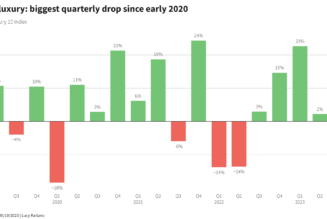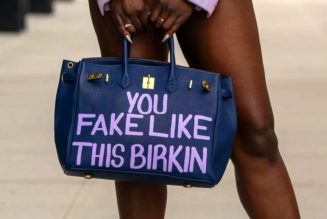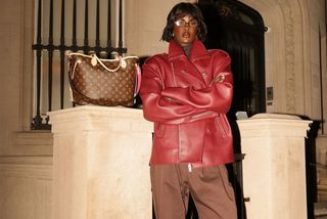
Summary: Capturing the intersection of luxury fashion and digital innovation, Tmall Luxury Pavilion’s recent endeavors showcase how traditional brands are expanding into the dynamic world of e-commerce and livestreaming. With record-breaking viewer engagement and unique digital features, the platform underlines the changing landscape of luxury retail.
Fashion enthusiasts from around the globe tuned into their screens as over a dozen luxury fashion brands embraced the digital stage, broadcasting their runway shows live from fashion capitals like Paris and Milan directly on Tmall. The shows, which featured exclusive designs and interactive elements, are a testament to the changing times in the fashion industry. Balenciaga, a brand known for pushing boundaries, saw a massive virtual turnout of 1.4 million viewers for its innovative catwalk showcase, indicative of the immense potential for fashion in the digital realm.
Valentino took the online experience a notch higher by incorporating Tmall’s raffle system into their livestream, rewarding viewers with special gifts and drawing an enthusiastic 23,000 participants. Such strategies proved effective, as various luxury labels witnessed a surge in followers and engagement on their Tmall stores, far exceeding regular traffic.
Janet Wang, the mastermind behind Tmall Luxury Pavilion’s success, is charting new territory in China’s online luxury retail space. She focuses on blending live commerce with other trailblazing technologies such as the metaverse, blockchain, AR, and 3D, to create an immersive and interactive shopping environment.
Highlighting the tremendous growth of Tmall Luxury Pavilion, Wang shared that a majority of the platform’s consumers are well-informed, financially savvy women born after 1995, who approach luxury shopping with both enthusiasm and prudence. She advocates for the use of Tmall’s multifaceted tools to cater to the evolving needs of these consumers.
Furthermore, Wang identified Very Important Customers (VICs) as a key group sustaining the luxury market in China, particularly through a difficult economic period. This demographic’s strong purchasing behavior and loyalty are evident with over half the platform’s sales attributed to recurrent VIC purchases.
In response to the personalized demands of modern shoppers, Wang emphasized the significance of brands rendering their unique cultural heritage through digital channels, mentioning Tmall’s 3D and AR features as avenues to enhance the product experience and brand storytelling.
Despite economic headwinds, Tmall Luxury Pavilion’s users remain upbeat about investing in luxury, signaling a bright future for brands that continuously innovate their online presence to adapt to shifting consumer behaviors.
Industry Expansion and Market Forecasts
The fusion of luxury fashion and digital innovation, as seen on Tmall Luxury Pavilion, marks a significant shift in the industry’s approach toward online retail and immersive experiences. The luxury goods sector has historically been characterized by exclusivity and in-person customer service. However, the digital revolution, paired with the rise in e-commerce, has led luxury fashion to venture into the online world vigorously.
Market forecasts suggest that the global luxury market is set to continue its growth, with online luxury sales expected to triple in the next decade. The Asia-Pacific region, and China in particular, is anticipated to fuel much of this expansion, becoming the largest market for luxury goods. With extensive digital adoption and a burgeoning middle class, Asia’s young, tech-savvy consumers are driving demand for luxury e-commerce.
Issues and Challenges Facing the Industry
While the potential is vast, luxury brands face distinct challenges in a digital landscape. Authenticity and counterfeit goods remain significant concerns, as the tactile and personal experience of luxury shopping is translated into a virtual format. Brands need to ensure that their online presence upholds the same quality and authenticity as their physical offerings. Furthermore, as the online marketplace becomes increasingly crowded, standing out and maintaining the brand’s unique identity becomes more complex.
Sustainability is another growing issue within the luxury fashion sector. As consumers become more environmentally conscious, they demand that brands prioritize eco-friendly practices and transparency in their supply chain. This foresight is further emphasized by the rise of sustainable luxury brands, challenging traditional houses to adapt and innovate.
There is also the challenge of integrating the latest technology while maintaining a seamless, user-friendly experience. Technologies like AR, VR, and blockchain require significant investment and expertise to implement effectively. Luxury brands must balance these innovations with usability to avoid alienating less tech-savvy customers.
Despite these issues, platforms like Tmall Luxury Pavilion are offering promising solutions and paving the way for a new era in luxury retail—one that harmoniously blends tradition with cutting-edge technology.
Future Outlook
Tmall Luxury Pavilion’s strategic use of livestreaming and digital innovation to enhance brand storytelling and customer engagement has set a benchmark in the industry. With the understanding that the younger generation values experiences, interactivity, and personalization, luxury brands are likely to further invest in digital channels that meet these expectations. Additionally, as figures like Janet Wang suggest, the key to success lies in catering to the needs of VIP customers who continue to support the luxury market, especially during economic downturns.
Given the unmistakable move towards e-commerce and digital avenues within the luxury industry, brands that continue to evolve and innovatively engage with their customers online can look forward to a resilient and flourishing future. As trends such as livestreaming and the integration of AR and 3D technologies become more mainstream, the shopping experience is expected to become even more immersive and interactive, further blurring the lines between physical and digital luxury retail.

Roman Perkowski is a distinguished name in the field of space exploration technology, specifically known for his work on propulsion systems for interplanetary travel. His innovative research and designs have been crucial in advancing the efficiency and reliability of spacecraft engines. Perkowski’s contributions are particularly significant in the development of sustainable and powerful propulsion methods, which are vital for long-duration space missions. His work not only pushes the boundaries of current space travel capabilities but also inspires future generations of scientists and engineers in the quest to explore the far reaches of our solar system and beyond.









